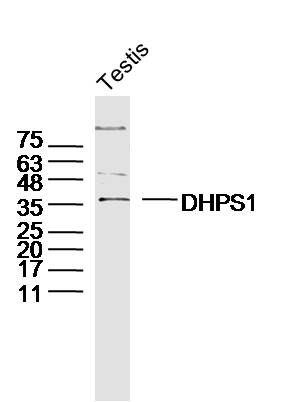产品货号 : mlR8260
英文名称 : DHPS1
中文名称 : 短链脱氢还原酶1抗体
别 名 : dehydrogenase/reductase (SDR family) member 1; Dehydrogenase/reductase SDR family member 1; FLJ25430; MGC20204; DHRS1_HUMAN.
研究领域 : 心血管 细胞生物 免疫学
抗体来源 : Rabbit
克隆类型 : Polyclonal
交叉反应 : Human, Mouse, Rat,
产品应用 : WB=1:500-2000 ELISA=1:500-1000 IHC-P=1:400-800 IHC-F=1:400-800 IF=1:100-500 (石蜡切片需做抗原修复)
not yet tested in other applications.
optimal dilutions/concentrations should be determined by the end user.
分 子 量 : 34kDa
细胞定位 : 细胞浆 细胞膜
性 状 : Lyophilized or Liquid
浓 度 : 1mg/ml
免 疫 原 : KLH conjugated synthetic peptide derived from human DHPS1:1-100/313
亚 型 : IgG
纯化方法 : affinity purified by Protein A
储 存 液 : 0.01M TBS(pH7.4) with 1% BSA, 0.03% Proclin300 and 50% Glycerol.
保存条件 : Store at -20 癈 for one year. Avoid repeated freeze/thaw cycles. The lyophilized antibody is stable at room temperature for at least one month and for greater than a year when kept at -20癈. When reconstituted in sterile pH 7.4 0.01M PBS or diluent of antibody the antibody is stable for at least two weeks at 2-4 癈.
PubMed : PubMed
产品介绍 : DHRS1 (dehydrogenase/reductase (SDR family) member 1), also known as SDR19C1, is a 313 amino acid protein that belongs to the short-chain dehydrogenases/reductases (SDR) family and likely functions as an oxidoreductase. Abundantly expressed in heart and liver, DHRS1 contains an SDR motif and is encoded by a gene that maps to human chromosome 14q12. Human chromosome 14 houses over 700 genes and comprises nearly 3.5% of the human genome. Chromosome 14 encodes the presinilin 1 (PSEN1) gene, which is one of the three key genes associated with the development of Alzheimer's disease (AD). The SERPINA1 gene is also located on chromosome 14 and, when defective, leads to the genetic disorder ?-antitrypsin deficiency, which is characterized by severe lung complications and liver dysfunction.
Tissue Specificity:
Detected in heart and liver, and at low levels in skeletal muscle, kidney and pancreas.
Similarity:
Belongs to the short-chain dehydrogenases/reductases (SDR) family.
SWISS:
Q96LJ7
Gene ID:
27071
Important Note:
This product as supplied is intended for research use only, not for use in human, therapeutic or diagnostic applications.
产品图片












